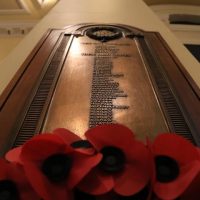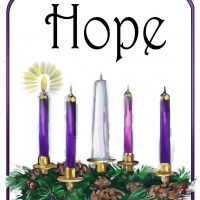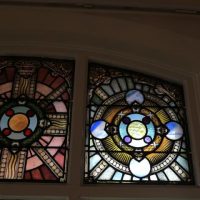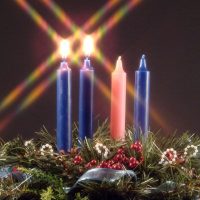Prayers of Approach
All-powerful one, we come today to worship you, safe in the knowledge that you are in control.
We thank you that we can come to you knowing that you care about each and every one of us, and all our needs, however big or small. You created the heavens and the earth. You put stars into space and filled the mighty seas. Your power and your greatness is all around us – from mountain-tops to the intricacies of a tiny flower. Thank you that your power is limitless. We are so small in comparison, but you love us all the same.
We praise you that you show us how to use power wisely. Help us, as we worship together, to learn more of your ways, to understand that our actions have consequences, and to seek your wisdom in making decisions that may impact on others. This we ask in Jesus’ name. Amen.
Hymn Jesus is Lord, creation’s voice proclaims it (R&S 268)
Readings: Amos 7:7-15
Mark 6:14-29
Introduction
Today’s readings explore the difference between human power and God’s power. Amos writes in the eighth century BC, shortly before the kingdom of Israel was destroyed by the Assyrian army, when the rich oppressed the poor. Mark, too, writes at a time when poor people were exploited. Both assert that real authority and power flow from God and in turn are validated by God’s call (Amos 7.15) and then by evidence of God’s power (Mark 6.14). There is no necessary association between such power and human (self)-importance, and when the two run up against each other, there is generally trouble. Both Amos and Mark speak of the hostility directed towards those who challenge Godless power.
Hymn God has spoken by his prophets (MP 831)
Sermon
Today’s gospel reading continues a theme of authority and identity, asking the question, ‘Who is Jesus?’ Jesus’ reputation is growing but his identity is still not clear. It is a matter of great debate among the people and the religious leaders. The people think he may be John the Baptist, Elijah, or a prophet, like one of the Old Testament prophets. The religious leaders are less inclined to accept any of these beliefs and some are beginning to see Jesus as a troublemaker. Despite the debates, and having killed John, King Herod’s guilty conscience leads him to believe that he is John the Baptist, raised from the dead and come back to haunt him.
The question of Jesus’ identity and authority, and consequent explanation or ‘revelation’ of it, occurs frequently in all four gospels, in Acts and in most of the epistles. The Old Testament prophets too often faced similar questions about who they were and where their authority came from, what right did they have to say the things they said. One of the problems that they faced in proclaiming God’s word was that very often they were not anything special, they knew their own weaknesses and limitations and were far from being extraordinary. God used Amos, an ordinary man, to speak his truth. Amos’ vision of the plumb line is a symbol of God’s judgement under which corrupt leadership – false religion and wicked kings – will face destruction.
Amos was not a professional prophet or church leader and yet God gave him words to speak out. A plumbline is a straight line — an upright line. God set the line for his people to follow but they found it hard to follow a straight path or to stand up straight against exploitation and injustice. I chose the final two verses of today’s reading as one of the readings for my ordination service. They spoke powerfully to me of what it was like to be called by God to a particular ministry and I identified with Amos’ words, ‘I am not a prophet… but the Lord took me… and said, Go…’ (Amos 7:14-15). Although I didn’t have a strong church background I did feel that I had been chosen, called and sent, maybe not to be a prophet but to preach, teach and minister to God’s people. And it was a calling which I could not ignore. Amos could not ignore his calling any more than could John the Baptist or Jesus himself, no matter where it led.
The passage from Amos and the Gospel account of John’s martyrdom both contain the message that religion should keep out of politics, but God’s servants nevertheless speak up. John was criticising the personal morality of the royal court. Amos was critical of international and domestic policies and was viewed as a traitor. In our gospel reading King Herod, a politician, was in a tight place. A ruler of Israel, he needed to be seen to keep the laws of Torah. But as a ruler appointed by Rome, he needed to maintain peace. Both John and Jesus, who upset the religious leaders, were risking the political stability of an occupied land. We can easily recognise ‘Herods’ today. It is all too easy for fragile governments to see any sort of challenge as coming from forces for evil, rebels, agitators. Yet figures like Amos, John and Jesus remind us that ‘ordinary people’, who challenge a regime, can be agents of God.
We often hear the phrase ‘speaking truth to power’. In reality, not many people get a genuine opportunity to speak truth to power close up. This week’s readings reveal what the true cost can be for those who do get the opportunity to challenge the powerful ‘face to face’. There is always a cost to being prophetic, even today; it may not result in death, but it will almost certainly lead to criticism and censure, and in some places worse. Is it our responsibility to challenge leaders? What would you like to say to our new Prime Minister, Keir Starmer? While we may each have an answer, what do we do about it? There are many means: we can write letters; vote; sign petitions; join political and campaigning groups. Perhaps we should do all of those. Do we have prophets who will speak out? Is this part of the vocation of a godly person? How easy is it to do the right thing and what can help us decide what is right or wrong?
Hymn From heaven you came helpless babe (R&S 522)
Prayers of Intercession
We praise you, living God, for those whom you call to be prophetic voices in our world today: for those who speak out about environmental issues; for those who call us to account about the impact of our life choices; for those who warn of a crisis that we can avert if we act creatively; and for those who speak to our churches words of truth, challenge and inspiration. May we have ears to hear what you would say to us, and hearts willing to respond in Jesus’ name.
Loving God, we pray for those whose voices are silenced: for those silenced for speaking out against corruption… and for justice; for those silenced for speaking out against greed… and for a fairer distribution of wealth; for those silenced for speaking out against animal cruelty… and for more humane alternatives; for those silenced for speaking out against pollution… and for more environmentally friendly solutions; for those silenced for telling the truth about things that have been covered up. Keep them strong when they are threatened, and be with them when they face danger and death. Give us grace, that we may not be afraid to be truth-tellers, but be your voice and your conscience in the world today. We ask this in Jesus’ name. Amen.
Hymn The kingdom of God is justice and joy (R&S 200)
Blessing
As we go may we be speakers of truth, empowerers of the voiceless and protectors of the vulnerable.
And may the blessing of Almighty God ever surround us, the grace of the Lord Jesus go with us and the inspiration of the Holy Spirit fill our hearts. In love, and in the light and strength of God, we pursue our hope. Amen.
Prayers and other material (adapted) © Roots for Churches Ltd. Used by permission.








